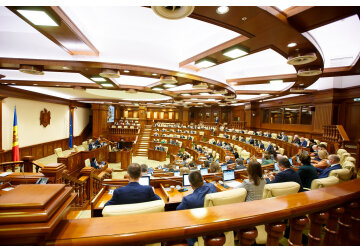
The Moldovan parliament has approved in the first reading draft laws on attracting $438.68 million in external state loans from the IMF under a new program to finance the state budget.
According to the head of the Ministry of Finance, Dumitru Budianschi, the new 40-month program approved by the International Monetary Fund on December 20, 2021 with a total disbursement volume of about $558.3 million, about $439 million will be attracted as external state loans to finance the state budget. In particular, $292.48 million will be received within the ECF mechanism to finance the budget needs, which will be repaid in 12 equal tranches after 4.5 years from each payment made from the loan account. The maturity of the loan is 10 years. A floating interest rate will apply, which as of December 20 is 1.05% per annum. Service fee will be 0.5% of the amount paid, and the commitment fee - 0.3%. At the same time, $146.2 million will be allocated under the EFF mechanism, which will be repaid in 10 equal tranches after 5.5 years from each payment made from the loan account. The interest rate on the concerned loan will be set every two years and will be equal to 0% until 2023. As InfoMarket agency earlier reported, on December 20, the IMF Executive Board approved Moldova's request for entering into an agreement on a program of economic reforms financed through ECF (Extended Credit Facility) and EFF (Extended Fund Facility) lending facilities. Following the approval of the authorities' request, Moldova got access to a tranche of about $79.8 million, which will be disbursed by the end of the year. The total sum of disbursements within the 40-month program, financed through ECF and EFF credit facilities, will amount to about $558.3 million. The new IMF program aims to support Moldova's recovery after COVID-19, meet urgent development needs and strengthen its institutional framework. The key reforms agreed with the IMF relate to enhancing transparency and accountability, improving predictability of public policies, consolidating financial institutions and encouraging competition. IMF loans will be used to finance budget needs. Priority expenditures will include expenditures on roads, the energy sector, water supply, efficient investments in health, education and job creation. // 24.12.2021 - InfoMarket.







